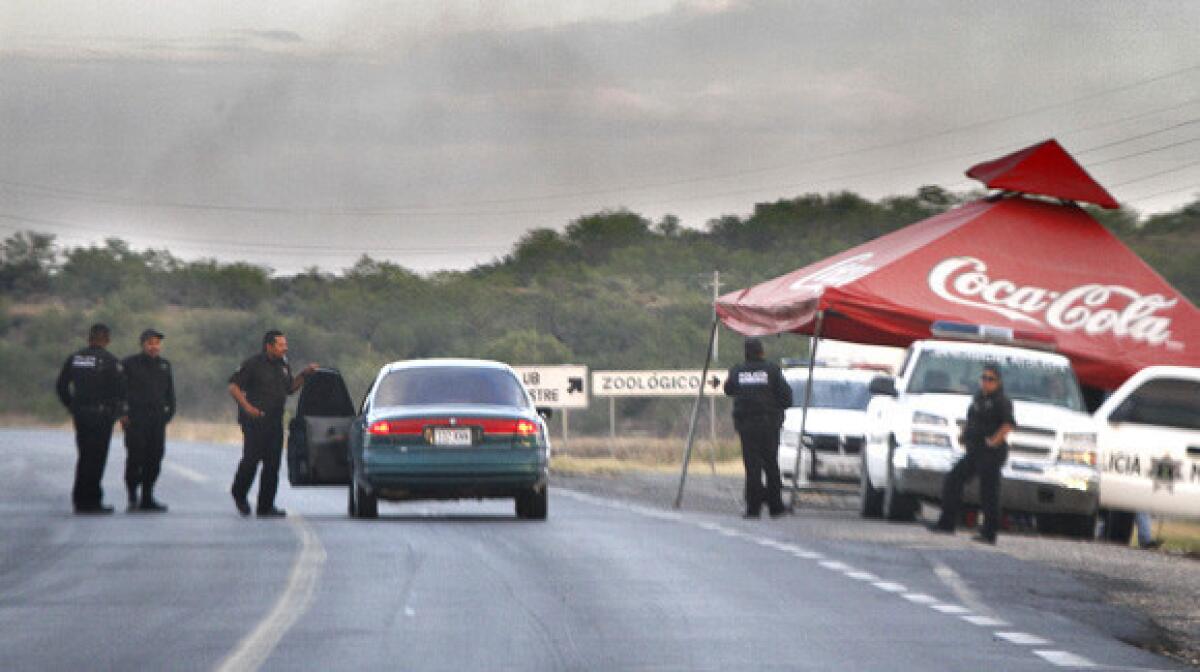Cross-country tour to point out the failure of the war on drugs

- Share via
SAN DIEGO — If there is a more profound and costly failure than the war on drugs, it hasn’t come to my attention.
In Mexico, an estimated 50,000 to 70,000 people have been killed or have disappeared since 2006, as drug cartels wage bloody battles in the lucrative business of feeding demand north of the border.
In the United States, billions of dollars are spent annually to arrest, prosecute and incarcerate people for drug crimes, with little or no effect on either supply or demand.
We don’t have as many fresh graves in the U.S., but we’ve got some staggering losses of our own.
“We’re losing our kids here, too,” said activist and mom Gretchen Burns Bergman, to addiction, to prison and to death by overdose.
Bergman’s living room in suburban San Diego is a command center and clearinghouse for information on Parents for Addiction Treatment & Healing, Families to Amend California’s Three Strikes, and Grief Recovery After Substance Passing. Both of Bergman’s grown sons have served time for nonviolent drug crimes, and she invited five other working, middle-class moms with stories of addiction and loss.
Today, all of them will be speaking at the kickoff of a cross-country tour whose aim is to reform drug policy on both sides of the border. They’ll be telling their stories along with Mexican poet Javier Sicilia, who lost his son to drug violence last year and will lead the caravan toWashington, D.C.
When the women told me they’ll each have only one minute to tell their story at the rally, I wondered how they could possibly pull that off. They could each speak for hours about promising young lives that went off track, about the sleepless nights spent worrying, and about the pain of watching a child slip away despite their best efforts. And as I heard these stories from solid citizens, I was reminded that this could happen to any of us.
“This is not a disease of bad parenting,” said Bergman, but that’s often how it’s judged.
Shawn Norton, a behavioral sciences student, said her daughter Candice “was an all-star softball player, and she was supportive of her younger sisters and brothers. But as soon as she started to experiment with drugs, something changed within her.”
After several years of drug abuse and incarceration, Candice died of organ failure. She was 18.
Diane Pierce, who works in medical transcription, said her son was “a typical kid growing up” but had begun experimenting without her knowledge. She got a call from school one day informing her he appeared to be high.
Pierce scolded him, pulled for him, loved him, got tough with him, pushed him out of the house when she thought that might help. “My every waking moment was spent trying to help him get better.”
She got a call one day. Better come fast, she was told.
Pierce drove to her son’s apartment, knowing he’d relapsed and trying to buck herself up for another tour of duty.
“I parked the car, I see his friends outside. People are crying. I’m still marching past them, angry at this point, and that’s when the sheriff told me.”
Her son was dead.
“He’d just turned 20,” said Pierce.
After the women had all spoken, Elizabeth Stewart, a registered nurse, turned to Pierce and said:
“I know you’ve lost your child, but I feel like I’ve lost mine, too. Because he’s never coming home for Christmas.”
Why not? Because her 25-year-old son is serving 70 years as a three-strikes offender despite committing what she called nonviolent crimes that stemmed from his addiction.
Why, asked Bergman, must we treat nonviolent drug use as a crime rather than a health issue? Why do we spend billions trying to cut off the supply despite no evidence that such a thing is possible? And why are we wasting precious resources going after marijuana that could be better spent on drug education and treatment?
The moms said their children had made bad choices, fueled in some cases by mental health issues. But once you’ve been kicked out of school or arrested, it’s hard to rebuild your life.
“There’s so much money in the prison system and criminal justice system,” Bergman said. “They’re so well-organized to scoop people into their big nets. But healthcare is so disjointed and parents and families have to mortgage their homes” to pay for drug treatment.
In Mexico last year, the poet Sicilia made a declaration after his son’s murder. Loosely translated, he said:
“We’ve had it.”
Sicilia said his son, 24, was asked by five friends to go with them to a bar to retrieve some items stolen from their car.
The bar was run by narco-traffickers, said Sicilia, and his son and five friends were murdered.
“My son was an extraordinary person,” Sicilia said Friday in an email to me, “hard-working, brimming with a sense of humor and in love with life.”
Sicilia has led a call for policy changes on both sides of the border, arguing that economic and human investment in Mexico makes more sense than continued militarized attacks on cartels. As for the trip across the U.S., Sicilia said, “the goal is to provoke the conscience of American society as to the role it has in this war and the necessity that we work together for peace.”
On Monday, the caravan will be on Olvera Street in downtown Los Angeles from 11 a.m. to 7 p.m. Sicilia is scheduled to be there, a cross-border messenger representing a lost son and letting out a cry for the San Diego moms and all the others, too.
“We’ve had it.”
More to Read
Sign up for Essential California
The most important California stories and recommendations in your inbox every morning.
You may occasionally receive promotional content from the Los Angeles Times.














